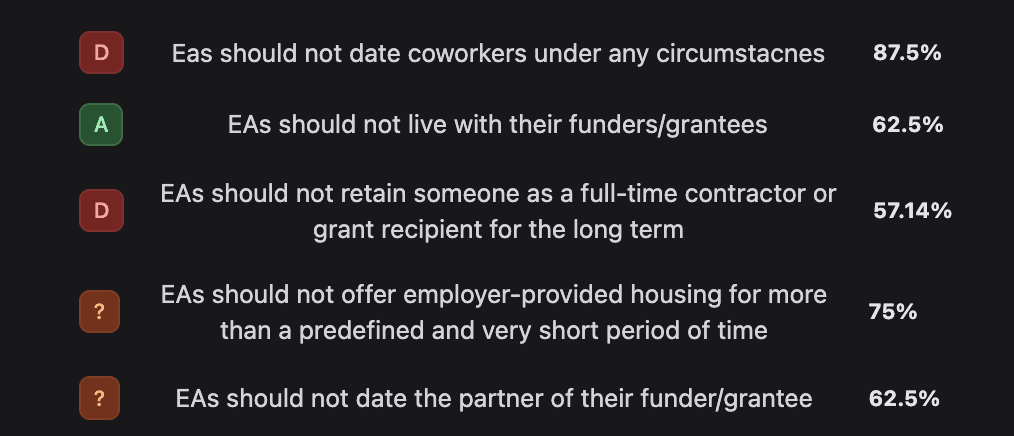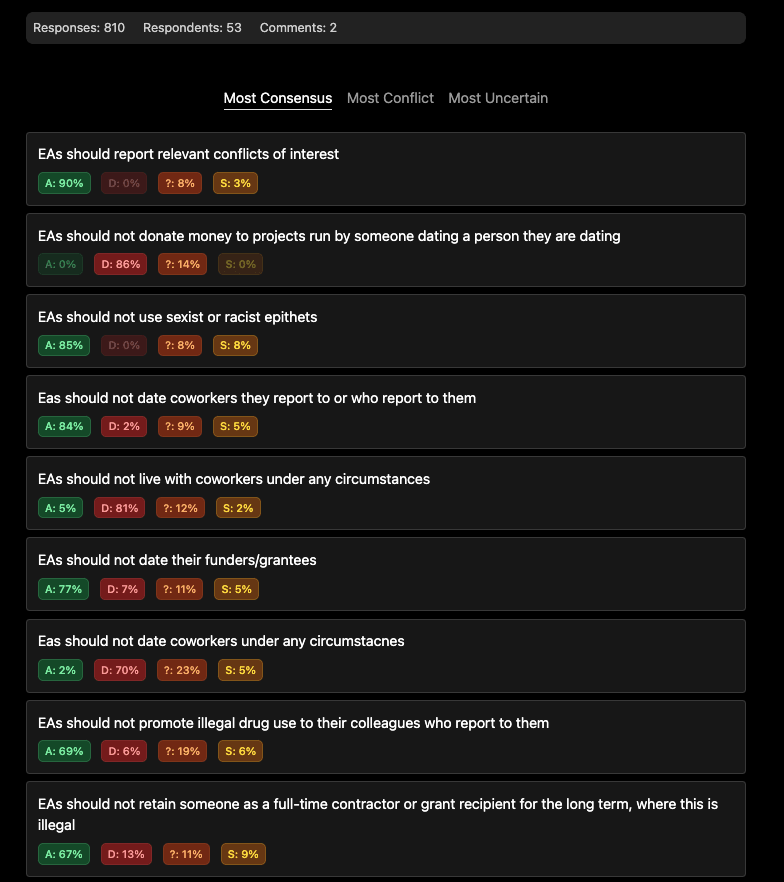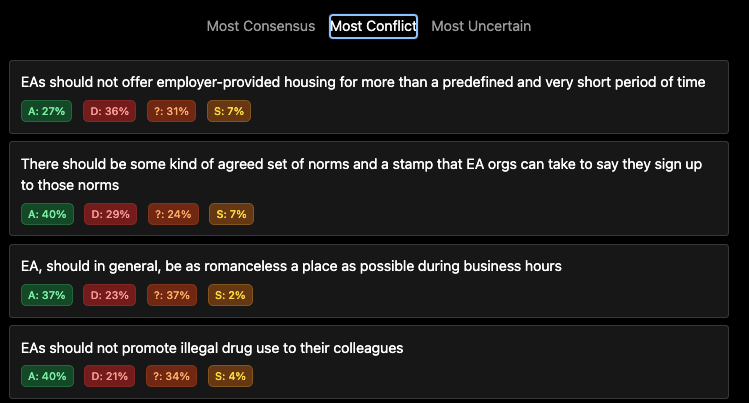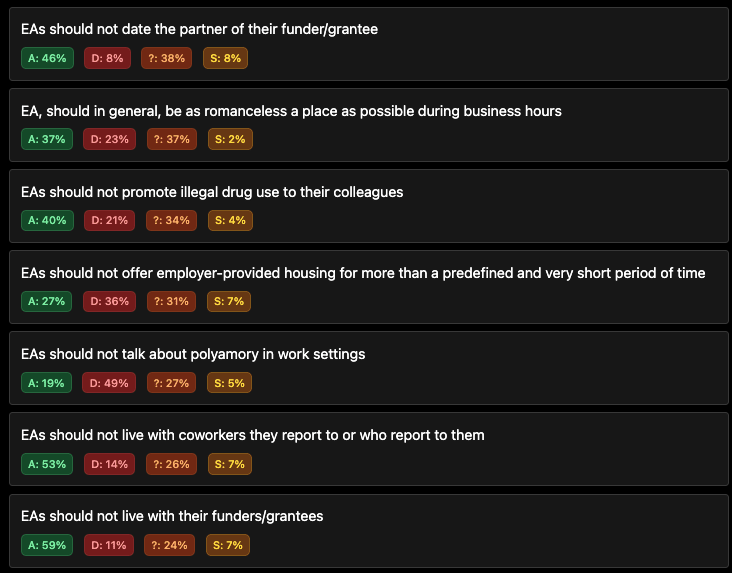There has already been ample discussion of what norms and taboos should exist in the EA community, especially over the past ten months. Below, I'm sharing an incomplete list of actions and dynamics I would strongly encourage EAs and EA organizations to either strictly avoid or treat as warranting a serious—and possibly ongoing—risk analysis.
I believe there is a reasonable risk should EAs:
- Live with coworkers, especially when there is a power differential and especially when there is a direct report relationship
- Date coworkers, especially when there is a power differential and especially when there is a direct report relationship
- Promote[1] drug use among coworkers, including legal drugs, and including alcohol and stimulants
- Live with their funders/grantees, especially when substantial conflict-of-interest mechanisms are not active
- Date their funders/grantees, especially when substantial conflict-of-interest mechanisms are not active
- Date the partner of their funder/grantee, especially when substantial conflict-of-interest mechanisms are not active
- Retain someone as a full-time contractor or grant recipient for the long term, especially when it might not adhere to legal guidelines
- Offer employer-provided housing for more than a predefined and very short period of time, thereby making an employee’s housing dependent on their continued employment and allowing an employer access to an employee’s personal living space
Potentially more controversial, two aspects of the community I believe have substantial downsides that the community has insufficiently discussed or addressed:
- EA™ Group Houses and the branding of private, personal spaces as “EA”
- "Work trials" that require interruption of regular employment to complete, such that those currently employed full-time must leave their existing job to be considered for a prospective job
As said, this list is far from complete and I imagine people may disagree with portions of it. I’m hoping to stake this as a position held by some EAs and I’m hoping this post can serve as a prompt for further discussion and assessment.
- ^
“Promote” is an ambiguous term here. I think this is true to life in that one person’s enthusiastic endorsement of a drug is another person’s peer pressure.





A lot of these are phrased in ways that immediately sound like "oh, well of course you wouldn't do that", but the situations in which people end up doing them are generally much more ambiguous. When I think over my ~15y in the workplace I can find examples of essentially all of these, in my life or a close coworker, that I wouldn't classify as probably a bad idea:
In ~2016 one of my housemates who I'd been friends with for 5+ years recruited another of my housemates (who I'd been friends with for 10+ years) to join an EA-aligned company. The next year they recruited me as well. None of us reported to each other, but both of them were tenants of mine (my wife and I owned the house) and we were something like three of five people working for the company in Boston at the time.
I do think there was risk here, but I also think it was a pretty small one, and this would not have been a good reason for either me or my other housemate to say "sorry, not going to consider this job".
In ~2018 while I was working on a team of ~20 at a tech company, two of my coworkers (reporting peers of each other, but I think maybe one was the tech lead of the other) realized they liked each other. They talked to our manager and HR, one of them moved to another team, and they started dating. As of when I last caught up with them a few months ago they were still together. There was definitely risk here, but from the outside it seems like the process for handling it was good, and it would be really sad for both of them if this relationship hadn't happened.
In ~2008 my girlfriend (now wife) and I applied for a seasonal job where we'd both be working in the kitchen. We disclosed this relationship to the hiring manager, and while I would normally have reported to the person in my girlfriend's role they set things up so I'd report to someone else. This wasn't an issue, and I think refusing to hire us because we were dating would have been worse for both the employer and us. Some coworkers dated each other while we were there, and I think this was generally positive.
On the other hand, cases where the organization does not adjust the org chart in response to relationships are much more risky and almost always a bad idea. Managers shouldn't date their reports, and neither should anyone date someone where they have significant power over their career. This does mean sometimes choosing between exploring the possibility of a relationship and continuing specific career plans.
Something like every place I've worked made alcohol available to employees in social situations, plus caffeine in ~all situations. If this had been cocaine I think we'd clearly see that as promoting cocaine consumption.
Pressuring people to consume drugs seems quite different, and that I'd agree is almost never a good idea.
In ~2015 when I was earning to give a large portion of my earnings went to CEA, which employed my wife (who I also lived with). When the EA Infra fund became available I started donating there instead, because a dynamic where I was donating to my wife's employer didn't seem ideal, but I don't think this was so risky that I should have refrained from donating to CEA until then.
How risky this category is depends a lot on how large a portion of the relationship each party is. In ~2015 my donations to CEA were ~$85k, which (I think) was a single-digit portion of their fundraising and my wife was one of ~20 employees. There's also a sense in which this is different because once I earned the money it was legally joint property with my wife, though at the time our agreement was we each chose where our earnings went.
I do agree that this category is generally pretty risky, though, and how you handle CoI matters a lot.
No direct experience with this one (not polyamorous) thought it seems like a slightly weaker case of the previous one.
I agree we should follow the law on contractors vs employees, but I don't actually understand what this is trying to get at beyond that? What's the sort of situation it's trying to avoid?
In ~2017 I was considering accepting an offer to work for a for-profit EA-adjacent startup in Africa, and the offer to provide housing was a strong positive. In moving to a very different environment, having the support of coworkers who've gone through something similar sounded really valuable.
From ~2016-2020 my wife and I employed a series of au pairs to watch our kids, which included providing them a room in our house.
In ~2008 my girlfriend (now wife) and I worked at a seasonal job in a rural area, which included on-site housing. Not having to commute was a strong positive.
...
Now, for all of these I can also easily imagine cases where the risk was not worth it and it went poorly, but I think "probably shouldn't do" is too strong overall.
Most of these "date co-workers" and "live with co-workers" examples seem to be where there is little power differential. For me the bigger the power differential, the bigger the risk, perhaps even growing exponentially (high uncertainty) the higher the differential.